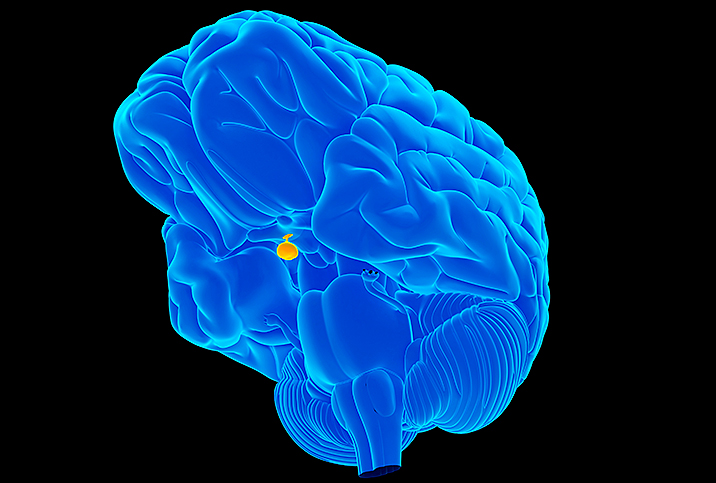The Pituitary Can Impact Fertility, But It Doesn't Act Alone

In this article, we intended to point a finger at the pituitary gland as a potential source for male infertility issues, to finally put it in its place for some reason. A plus B equals C. Come to find out, it's not that simple. What is, right?
So does the pituitary gland have anything to do with fertility in men? Yes, but...
Hang in there. Though not a straightforward explanation, the pituitary gland does play a role, but it's part of a larger system.
"The hypothalamus, pituitary gland and testes form a feedback loop, rather than the pituitary dictating fertility independently," said Christopher Sipe, M.D., a board-certified reproductive endocrinologist at Fertility Centers of Illinois. "In general, the pituitary reacts to the testicles. A true pituitary issue can manifest with thyroid issues."
'The pituitary gland produces several hormones, and some abnormalities with the production of one type of hormone may affect how the pituitary produces others.'
Sipe explained some of the physiology behind how the hypothalamus, pituitary gland and testes are connected:
- The hypothalamus communicates with the pituitary via gonadotropin-releasing hormone (GnRH), which causes the pituitary gland in the brain to produce the luteinizing hormone (LH) and the follicle-stimulating hormone (FSH). LH and FSH cause the testicles to make testosterone in men.
- The pituitary gland communicates with the testicles using FSH for sperm production and some testosterone production in conjunction with LH.
- Testosterone makes a feedback loop to the pituitary gland to moderate the production of FSH.
And let's not forget the thyroid.
"It is common, especially in women, to have hypothyroidism. But this can affect men, as well," said Shaun C. Williams, M.D., a partner in reproductive endocrinology at Reproductive Medicine Associates of Connecticut. "With a poorly functioning thyroid gland, the pituitary tries to produce more thyroid-stimulating hormone (TSH), which can interfere with the production of the other stimulatory hormones, FSH and LH. FSH and LH are important for both sperm and egg production."
The effect on reproductive function
Williams, who is board-certified in obstetrics and gynecology as well as reproductive endocrinology and infertility, outlined the reasons the pituitary gland might underperform.
"The pituitary gland produces several hormones, and some abnormalities with the production of one type of hormone may affect how the pituitary produces other hormones," he said. "Another hormone produced in the pituitary is prolactin (PRL). Small microtumors that produce prolactin are very common, and these small adenomas can also interfere with FSH and LH secretion, affecting both male and female reproductive function."
To try to put it simply, if a condition affects the pituitary gland and lowers LH and FSH levels, it can result in low or no sperm production and low testosterone levels, which can potentially affect fertility.
Conditions that can affect the pituitary gland include:
- Pituitary tumors (adenomas), which are noncancerous but cause your pituitary gland to produce lower levels of hormones.
- Kallmann syndrome, a rare genetic syndrome in which the hypothalamus fails to release GnRH.
- Central or secondary hypogonadism, in which your hypothalamus and pituitary gland, which communicate with your testes, don't work correctly, and not enough FSH and LH are produced.
- Hypothyroidism, as explained above.
Sipe said true pituitary issues can arise from any of the cells that make FSH, LH, TSH, PRL, human growth hormone (hGH) or adrenocorticotropic hormone (ACTH), which stimulates the production of cortisol.
Are there ties to genetics or lifestyle factors?
Lifestyle has very little to do with issues that affect the pituitary gland, according to Williams. Unfortunately, without any specific risk factors, nothing can be done to prevent problems.
"However, hypothyroidism can affect multiple family members, so there may be a genetic component," Williams added. "But many cases of hypothyroidism are sporadic or related to autoimmune changes. And problems like microadenomas [small, noncancerous pituitary tumors] likely have no genetic predisposition."
How to find out if the pituitary is affecting fertility
If you and your partner are struggling to conceive, you can try to determine whether your pituitary gland is part of the problem.
"If the pituitary gland is functioning abnormally, both FSH and LH production may be altered, leading to irregular menses in women or low testosterone and sperm levels in men," Williams said. "Measuring testosterone levels, as well as FSH, LH, TSH and PRL, is often one of the first assessments for men with low sperm counts, decreased libido or erectile dysfunction. Often, an MRI is obtained to make sure no other major problems are affecting the pituitary gland."
Fortunately, pituitary abnormalities are often easy to treat, and thyroid disorders can be easily corrected through the use of thyroid hormone oral supplements.
"Microtumors producing prolactin can be suppressed with other medications," Williams said. "Often, both FSH and LH can be used to help correct pituitary issues that interfere with egg production, and other medications may help boost pituitary function for males, such as clomiphene or hCG [human chorionic gonadotropin]."
To sum up this complex feedback loop: A lack of stimulation of the testes by the pituitary hormones LH and FSH can affect fertility but is often easy to treat. So don't be too quick to point a finger at the pituitary gland.




















